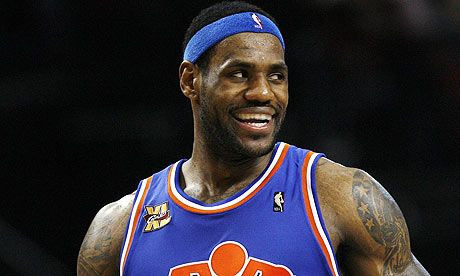NBA TV Deal 2014: What The $24 Billion New Agreement Means For The League

The National Basketball Association just got a little wealthier, thanks to a new mega television deal. The NBA, which boasts highly visible sports personalities like LeBron James, Kobe Bryant, Kevin Durant, Derrick Rose, and Carmelo Anthony, will be back with their previous broadcast partners, but at a much steeper price.
The NBA has come to terms with both Turner Broadcasting System Inc. and the Walt Disney Co., agreeing to nine-year contracts that begin with the 2016-17 season and run through the 2024-25 campaign. The media rights deal means games will continue to be broadcast on TNT, ESPN and ABC, in addition to digital platforms.
NBA Commissioner Adam Silver said Monday the league had discussions with Comcast and Fox, but no negotiations ever took place. While the NBA won't be changing networks, the new deal is more lucrative than past agreements.
During the length of the contract, the NBA is reportedly set to be paid $24 billion, averaging $2.6 billion a year. The deal is worth far more than the one that was reached in 2007, which was worth around $930 million each year. Prior to the current deal, the NBA reportedly received an average $767 million per season for its broadcast rights.
It was expected the NBA would get a lot more money for its TV rights, but the new deal even surpassed the expectations of former commissioner David Stern, who had privately told owners the next contract would double the old. When looking at the league’s increase in popularity, though, the $24 billion price tag might not be all that surprising.
“The growth of basketball globally, when matched with emerging media platforms and fan demand for content, were the key drivers,” David Carter of USC's Sports Business Institute told International Business Times.
In 2007, Game 1 of the NBA Finals drew a 6.3 national TV rating. This year, the first game of the series between the Miami Heat and the San Antonio Spurs registered a national rating of 9.0. Regular-season ratings on ABC were down from last year, averaging 5.4 million viewers, but it was still an increase from the 3.2 million viewers the network averaged when the 2007 deal was negotiated.
With the value of the league’s TV rights increasing exponentially, both owners and players will benefit.
“The owners are in great shape as they now have a substantial amount of revenue certainty as far as the eye can see,” Carter said. “This also really helps the lower-tier teams for which this revenue is vitally important. NBA players will see dramatic salary increases over time as the salary cap rises.”
At Monday’s press conference, Washington Wizards owner Ted Leonsis said there has never been a better time to own an NBA team. That’s saying a lot, considering Leonsis confirmed a report during the summer that said his franchise lost about $13 million last season.
Because of the agreement, players' salaries will reach new heights. The salary cap for the upcoming 2014-15 season will be slightly more than $63 million. NBA executives have told Ken Berger of CBS Sports when the new TV deal officially begins in 2016, the salary cap could skyrocket to more than $91.2 million.
The impending TV deal is the reason James, who at times seems like a Fortune 500 company all by himself, didn’t sign a long-term contract with the Cleveland Cavaliers during the offseason even though he has no intention of signing elsewhere in the near future. His two-year deal includes a player option for next season worth $42.2 million. In 2016, he’ll be able to sign a max contract that could increase his yearly salary to more than $30 million.
There’s a chance the deal could help drive the NBA to get rid of max contracts all together, according to Brian Windhorst of ESPN. Such a move would result in an incredible boost in salaries for superstar players like James and Durant.
The greatest impact of the TV deal will be seen in 2017, when the players’ union is expected to opt out of the current collective bargaining agreement. With NBA teams being sold for billions of dollars and the league selling broadcast rights for billions more, the players could be looking to get an increase in their share of the league’s revenue, which they agreed to decrease from 57 percent to 51 percent in 2011.
As the players and owners try to split the ever increasing league revenue, the NBA could be looking at another lockout. Three years ago, an extended lockout forced the NBA to trim the regular-season schedule from 82 games to 66.
© Copyright IBTimes 2025. All rights reserved.






















